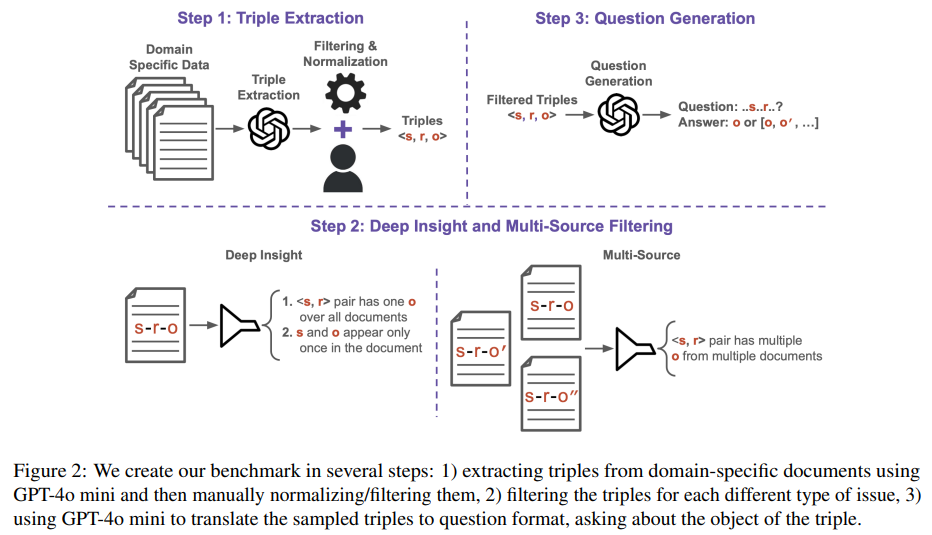RAG frameworks have gained attention for their ability to enhance LLMs by integrating external knowledge sources, helping address limitations like hallucinations and outdated information. Traditional RAG approaches often rely on surface-level document relevance despite their potential, missing deeply embedded insights within texts or overlooking information spread across multiple sources. These methods are also limited in their applicability, primarily catering to simple question-answering tasks and struggling with more complex applications, such as synthesizing insights from varied qualitative data or analyzing intricate legal or business content.
While earlier RAG models improved accuracy in tasks like summarization and open-domain QA, their retrieval mechanisms lacked the depth to extract nuanced information. Newer variations, such as Iter-RetGen and self-RAG, attempt to manage multi-step reasoning but are not well-suited for non-decomposable tasks like those studied here. Parallel efforts in insight extraction have shown that LLMs can effectively mine detailed, context-specific information from unstructured text. Advanced techniques, including transformer-based models like OpenIE6, have refined the ability to identify critical details. LLMs are increasingly applied in keyphrase extraction and document mining domains, demonstrating their value beyond basic retrieval tasks.
Researchers at Megagon Labs introduced Insight-RAG, a new framework that enhances traditional Retrieval-Augmented Generation by incorporating an intermediate insight extraction step. Instead of relying on surface-level document retrieval, Insight-RAG first uses an LLM to identify the key informational needs of a query. A domain-specific LLM retrieves relevant content aligned with these insights, generating a final, context-rich response. Evaluated on two scientific paper datasets, Insight-RAG significantly outperformed standard RAG methods, especially in tasks involving hidden or multi-source information and citation recommendation. These results highlight its broader applicability beyond standard question-answering tasks.
Insight-RAG comprises three main components designed to address the shortcomings of traditional RAG methods by incorporating a middle stage focused on extracting task-specific insights. First, the Insight Identifier analyzes the input query to determine its core informational needs, acting as a filter to highlight relevant context. Next, the Insight Miner uses a domain-adapted LLM, specifically a continually pre-trained Llama-3.2 3B model, to retrieve detailed content aligned with these insights. Finally, the Response Generator combines the original query with the mined insights, using another LLM to generate a contextually rich and accurate output.
To evaluate Insight-RAG, the researchers constructed three benchmarks using abstracts from the AAN and OC datasets, focusing on different challenges in retrieval-augmented generation. For deeply buried insights, they identified subject-relation-object triples where the object appears only once, making it harder to detect. For multi-source insights, they selected triples with multiple objects spread across documents. Lastly, for non-QA tasks like citation recommendation, they assessed whether insights could guide relevant matches. Experiments showed that Insight-RAG consistently outperformed traditional RAG, especially in handling subtle or distributed information, with DeepSeek-R1 and Llama-3.3 models showing strong results across all benchmarks.
In conclusion, Insight-RAG is a new framework that improves traditional RAG by adding an intermediate step focused on extracting key insights. This method tackles the limitations of standard RAG, such as missing hidden details, integrating multi-document information, and handling tasks beyond question answering. Insight-RAG first uses large language models to understand a query’s underlying needs and then retrieves content aligned with those insights. Evaluated on scientific datasets (AAN and OC), it consistently outperformed conventional RAG. Future directions include expanding to fields like law and medicine, introducing hierarchical insight extraction, handling multimodal data, incorporating expert input, and exploring cross-domain insight transfer.
Check out Paper. All credit for this research goes to the researchers of this project. Also, feel free to follow us on Twitter and don’t forget to join our 90k+ ML SubReddit.
The post Traditional RAG Frameworks Fall Short: Megagon Labs Introduces ‘Insight-RAG’, a Novel AI Method Enhancing Retrieval-Augmented Generation through Intermediate Insight Extraction appeared first on MarkTechPost.
Source: Read MoreÂ


